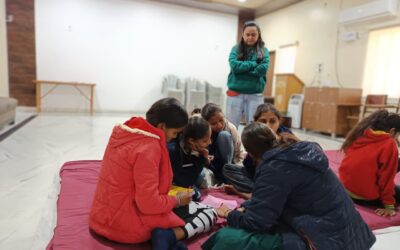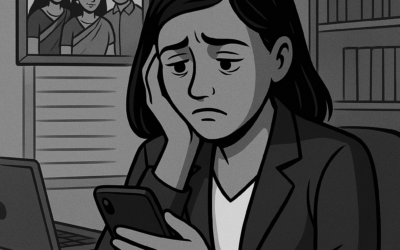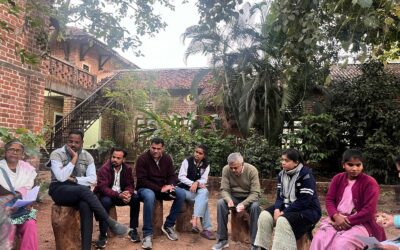I am in Karnataka now, as i write this. Change was the only constant in life in these past couple of months. I have moved to a geography I have never lived in before or have any association of. Find myself working in a domain for which I have never had any technical training (but lots of fascination) for. I am surrounded by people who prefer to speak to each other in their mother tongue, Kannada, which, for the first time, I don’t understand. I had often found myself feeling out of place in this very transitory time for me and this ‘out-of-place-ness’ and its many facets is what I intend to share in this blog.
Places shape much of who we are. ‘Place’ is more than just the physical space. Essentially, a place is the human experience of an environment. I find the analogy of ‘backdrops’ quite useful while thinking about being in places. Just like backdrops in portrait photographs, a ‘place’ is where one’s life unfolds, stories get told and identities formed. I have found myself in many new backdrops in life recently. This is an account of how I relate to them and sometimes, how I don’t
A Bus Ride To The Western Ghats
I have spent most of my life in places where if you are traveling and you look out of the window you would see just expanses of fields and clear skies. As I write this, I vividly remember the hues I would see in different months of the year. One could fall asleep by the window looking at those landscapes. This is very unlike waking up in a bus to Kundapura (which I board from Bengaluru every alternate week for work engagements). Within five minutes of looking out the window, one would pass through a calm estuary, a dense forest, a patch of wet grasslands and stern plateaus. There is so much to learn and familiarize with.
One of these weeks I was accompanying my colleagues in mapping infrastructure in a hamlet on the peripheries of Mookambika Wildlife Reserve. This is part of an engagement in which my organization, is setting up a community-owned network infrastructure. The hamlet is located on a higher elevated land than the rest of its surrounding. There is only a steep mud road that connects this hamlet to the village and the telecommunication network is very poor.

During our mapping exercise here, I came across, what I thought, to be a small pond. The amorphous form of this pond was quite fascinating to me. But I was also puzzled thinking why are people so nonchalant about it. Over the next two days, we did a couple of transect walks with young adults who live in the hamlet and the Kere (lake in Kannada) was not recorded in any of these walks.
It was only on my last day there that the bubble was busted. It was my colleague who informed me and helped me make sense of how and why the Kere exists there. I had observed and mapped many laterite mining sites in the hamlet the previous days. What I was thinking to be a small pond was, in fact, just an old quarry that hadn’t been filled after mining.
Kannada Gotilla
How can I be with people if I cannot speak their language? I would have this thought constantly for the first few weeks as I moved to Karnataka. It was my only slight inhibition about the role I was signing myself up for. I work here now with Aruvu Collaboratory. To learn Kannada was one of my top priorities. It was as if I felt I cannot operate if I don’t learn the language.
Experiences in the field have been the nudges I needed to think about this differently. I would usually let my colleagues engage in conversations while I would just listen and try to make sense. But I have often found myself in situations where people in the communities we work with would make an effort to translate things for me. In one instance, a woman requested her mother and my colleagues to switch the conversation to Hindi so that I could also understand.
I also feel much supported by my colleagues who translated endless conversations for me. After each conversation, I would have my own set of questions to ask them. More importantly, there have been conversations which have helped me move beyond language and think of communication which is at the core of my concern. Verbal exchange is just one medium of exchange. I am excited and look forward to other media of exchange I can learn from.
Collaboration, Communication And Co-learning
Across a spectrum of approaches, there is recognition of greater value in sharing agency with the community when it comes to knowledge production. This also happens to be a core value for my practice. It is about putting people and places at the core of all the work we do.
But there is, at times, much grey area which remains unresolved if we keep thinking about the community and evade thinking about our roles, relationships and responsibilities in collaborative knowledge production.
I have found myself in two situations that often arise for me in this context. In times when I am thinking critically of the role we play in working with community, I find myself struggle to do or make. Every idea, every framework falls into a feedback loop in the mind and is eventually negated. An other facet of this is to think that all actions in the field must come from the people itself and we should not do anything.This also brings complacence and lethargy when trying to work with communities.
I have found it useful to bring emphasis to the prefix ‘co-‘ in contexts of co-learning with community. This is to say, that our role is not just of observation while the community learns. A passive role as such reinstates the hierarchies in knowledge-production. After struggling to feel ‘placed’ in my new role, I have learned at least this – come as you are.




0 Comments